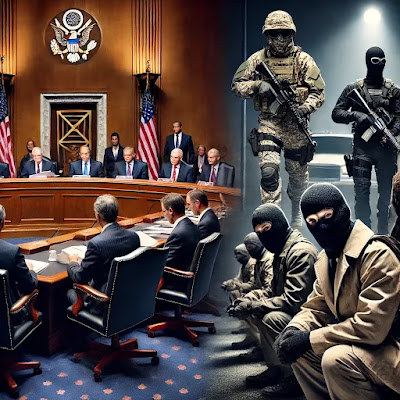 |
| When Secrecy Saves Lives: Why the CIA Needs to Operate in the Shadows |
Forty
years ago, Senator Frank Church came out swinging, calling the CIA a
"rogue elephant rampaging out of control." It was a catchy phrase,
something that stuck in people’s heads, and it made the agency sound like a
wild beast, running amok without anyone keeping an eye on it. Sure, the idea
had some truth to it, but it completely missed the bigger picture.
What Church didn’t get was that by
slapping heavy-handed oversight on the CIA, he was actually tying the hands of
the very people who were out there protecting America from serious threats. His
committee’s deep dive into CIA activities wasn’t just about uncovering
wrongdoings—it sparked a bunch of reforms that made it a lot harder for the
agency to get the job done. All those new restrictions might have looked good
on paper, but in the real world, they slowed everything down. The CIA found
itself caught in red tape, just when it needed to be nimble and quick.
Church’s big move to rein in the agency
didn’t fix the problem—it made it worse. The enemy didn’t take a break because
of more paperwork. It kept plotting. And the people on the front lines, the
ones who were supposed to stop them, suddenly had one arm tied behind their
backs.
A prime example of how Church’s actions
backfired came in the 1970s, when his findings led to the CIA having to pull
back on missions aimed at stopping terrorist groups. Suddenly, the agency was
shackled by new rules and oversight, forced to dial back vital
intelligence-gathering that had kept groups like the Popular Front for the
Liberation of Palestine (PFLP) in check. As a result, the PFLP gained ground,
unchecked and growing bolder. Not long after these restrictions, they pulled
off a string of high-profile hijackings, including the infamous Entebbe hostage
crisis in 1976. It was a disaster.
Had the CIA not been held back, there’s a
good chance those attacks could have been prevented. But instead, the agency
found itself operating with one hand tied behind its back, all because Senator
Church pushed a narrative that didn’t fully reflect the brutal realities of
international espionage. His well-meaning attempts to put the CIA on a leash
actually left America more vulnerable. Sometimes, the very secrecy he
criticized is exactly what keeps the country safe.
Church’s investigation also gave birth to
permanent intelligence committees in Congress. The idea was to make sure the
CIA didn’t run wild and that future covert operations were properly monitored.
Sounds good, right? In theory, sure. But in practice, it didn’t exactly work
out that way. These committees quickly figured out how to play the game
themselves, using plausible deniability to cover their own backs when things
went south.
Take 1984 as an example. President
Reagan’s CIA was running a covert op, mining the harbors in Nicaragua to
undermine the Sandinista government. The CIA had briefed both the House and
Senate intelligence committees on the operation early in the year, but when the
media broke the story in April, suddenly everyone in Congress acted like they
were blindsided.
There was all this “outrage” and “shock,”
but the truth was, they knew. They’d been briefed. The problem wasn’t that they
didn’t know—it was that they didn’t want to take the heat when things went
public. Senator Patrick Leahy hit the nail on the head when he called it “a
lousy job of legislative action.”
In the end, the committees had adopted the
very same plausible deniability they claimed they were trying to prevent, all
while leaving the CIA exposed and America in more danger than before.
The thing about too much oversight is, it
can actually work against the very thing it’s supposed to protect—national
security. There’s a fine line between holding the intelligence community
accountable and exposing its operations to unnecessary risk. Not every covert
mission can be written down, argued over, and picked apart by Congress. Some
things have to stay in the dark. That’s where real spycraft happens—under the
radar, where exposure isn’t just an inconvenience, it’s a genuine threat to
national security.
In my spy thriller Mission
of Vengeance, CIA operative Corey Pearson operates at what’s called
the "Obscure Transgression" level—or OT level. At OT level, only
Pearson, his team, the President, and the top brass at the CIA know what’s
really going on. There’s no congressional oversight, no committees poking their
heads into the mission. It’s a world of black funding and total secrecy.
They’re not out there dodging accountability; they’re keeping things quiet
because some threats are so serious, they can’t afford to play by the usual rules.
At OT level, Pearson and his team take on the most dangerous missions with the
understanding that exposure doesn’t just risk the operation—it puts the entire
country in danger.
We’ve seen real-life examples of covert
missions getting compromised, often by the very congressional committees meant
to keep them safe. When that happens, it’s not just the mission that goes
down—it’s America’s ability to stay one step ahead of its enemies. Some secrets
are meant to stay buried for a reason. Sometimes, plausible deniability isn’t
just a tool for the President—it’s a necessity for the operatives risking their
lives to keep us safe.
Yes, oversight is crucial. But there are times when too much oversight becomes the problem, not the solution. At the end of the day, protecting America means letting the CIA do what it was designed to do—operate in the shadows, out of the public eye. Because once you start exposing every secret, you risk exposing the very defenses that are keeping us safe in the first place.
Robert Morton is a member of the Association of Former Intelligence Officers (AFIO) and the author of the "Corey Pearson- CIA Spymaster" spy thriller series.






No comments:
Post a Comment